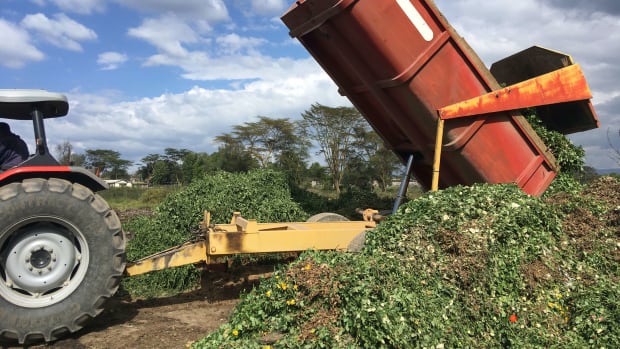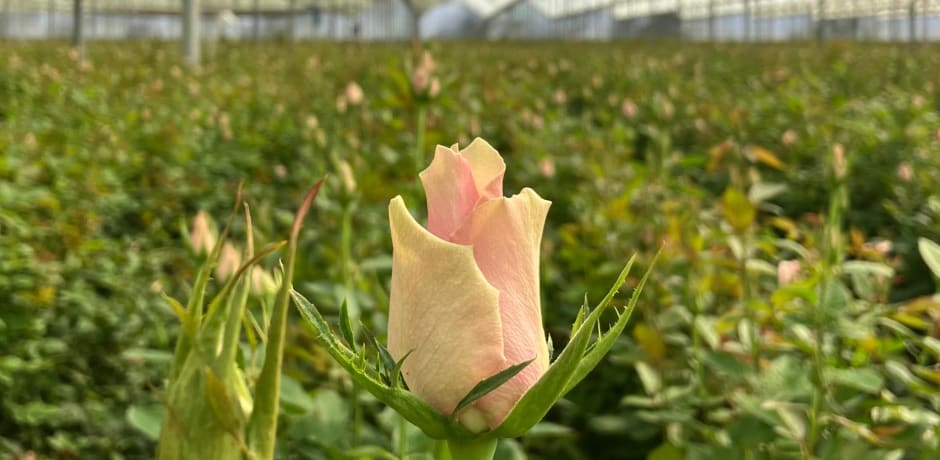
There is nothing romantic about rotting roses. This PhD student came up with a solution in Kenya
With Valentine's Day approaching, sales of roses are peaking. This romantic tradition also has a downside: besides the costly production, growing roses also generates a considerable mountain of cutting waste, left useless at the side of the road in Kenia. UvA PhD student Evy de Nijs developed a way to turn rose waste into compost for new roses.
When Evy de Nijs’ supervisor was in Ethiopia and saw considerable mountains of rotting rose waste at a rose farm, he wondered, “Shouldn’t we do something with that?” For her doctoral research, De Nijs investigated how to turn these mountains of waste into fertile compost. Appropriately enough, De Nijs is defending her dissertation on Valentine’s Day.
Eight years of problems
“The idea of organic fertilization was already buzzing around in the rose-growing community in Kenya. If someone figured it out, they were willing to try it,” says De Nijs. So, De Nijs and her research team had emailed growers in Kenya with an offer: “You have a problem that can be solved by us, on condition that you want to join our research.” One grower came forward who was curious about how the researchers could process rose waste into sustainable compost.
Growers in Kenya had long been reluctant to do anything with rose waste. First, these growing piles of waste could be ignored for a long time because of the large space available. Second, additional concerns apply specifically to rose waste: the woody stems make the composting process difficult, and the acids in the flowers are harmful to new plantings if they do not break down completely. Third, rose growers didn’t dare take the risks since rosebushes grow for eight years before they are replaced. “If you add something to the soil that is not good for your crop, you could have problems on your crop for eight years. If your plants die, it costs an awful lot of money.”

Two thousand kilograms of green waste
De Nijs uses mature compost as a kickstarter for the composting process of rose waste. The research team tested different combinations of materials already present at the farm. “The most important thing is to monitor the process properly,” De Nijs explains. “If you ensure the right amount of oxygen and water, you get a reliable end product.”
Studies were already conducted about how to process rose waste into compost. For example, you could first chop the stems into small pieces and add 20 percent manure. De Nijs: “I did research at a grower with forty hectares of land and he had two thousand kilos of green waste every day. Chopping two thousand kilos of rose waste and adding four hundred kilos of manure is unrealistic, especially while manure is already a valuable product in Kenya. That makes it economically unfeasible.”
But is it sustainable to grow roses in Kenya and then import them to the Netherlands? De Nijs responds: “In the past two or three decades, almost all Dutch rose growers moved to Kenya because of low costs, a better climate for rose growing and lower labor costs, despite the distance from Europe. If you look at the carbon footprint, producing in Kenya and importing to the Netherlands is more sustainable than growing roses in the Netherlands. As long as there is demand from the West, I think it is important that we make that production as sustainable as possible.”
Telephone advice
The results of the new rose waste compost are promising. Adding this compost to the crop ensures that nutrients were retained in the soil longer than when using artificial fertilizer. It also allows the roots of the plants to grow better through the airier soil. For one grower, this led to a yield increase of 4 percent, which amounts to about €22,000 of additional income per hectare for the first year and a half of the crop.
These positive results sparked the interest of other growers in the region. One of the participating growers has even invested in a compost converter, making the process more efficient. De Nijs is happy about this: “Science is sometimes very abstract, but the nice thing about this project is that growers are actually using it. Growers haven’t read my thesis but they call me regularly asking: what do you recommend?”
Strange obsession
In addition, doing research at rose nurseries has changed De Nijs’ view of the rose. “I now understand better why roses are expensive. When I see a bunch of roses with a discount sticker in the supermarket, I find it hard to see. I now know how many hands it goes through before they reach the market.”
The Kenyans themselves find our obsession with roses odd. De Nijs was sometimes asked: is it really true that you put those flowers on the table? “For them, flowers are just work,” says the biologist. “For us, it’s an extreme luxury item.”
Evy de Nijs will receive her PhD on Friday 14 February at 11 AM on her thesis Closing the cycle of resources: Exploring the potential of composting in Kenyan rose cultivation. The defence will take place in the Lutherse kerk.



